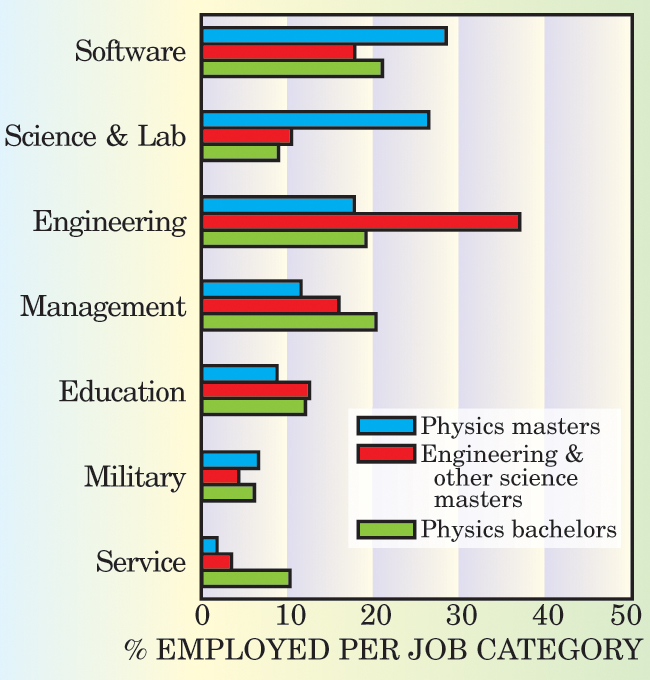Masters in the Field
DOI: 10.1063/1.1595051
Physics bachelors who earn a master’s degree in any math, science, or engineering field have higher salaries and a greater appreciation of their undergraduate training than their counterparts with only a bachelor’s, according to a recent report by the American Institute of Physics.
The new report zeroes in on physics bachelors who hold a master’s degree and are in the work force. They represent some 25% of the respondents to AIP’s broad survey on employment trends of physics bachelors, which was conducted in 1998–99 and focused on graduates from 1990 to 1993 (see Physics Today, September 2002, page 32
Among those with master’s degrees, 40% are in physics, 40% are in other math, science, or engineering fields, and 20% are in business, education, health, and other nonscience fields. Physics masters work mostly in science and lab jobs and in software, while the largest fraction of people holding a master’s in another science field or engineering are employed in engineering (see figure). Physics bachelors with no additional degree are employed in software and engineering in comparable proportions to physics masters, but they hold relatively fewer science and lab jobs and are more strongly represented in management—probably, the report notes, because of having spent 14 months longer on average in the work force.

Field of the employment of physics bachelors with a masters’s degree in physics, a master’s in another science or engineering field, or no additional degree.

A master’s in physics bumped annual salaries up by $3900, and a master’s in another science or engineering field netted $4300 more than just a physics bachelor’s. Other factors that boosted pay included having the responsibility to hire bachelor’s-level employees (+$5200), being male (+$2600), and years of experience (+ $800 per year).
People who added a master’s to their resumé rated their undergraduate education as more useful preparation than those who stopped after the bachelor’s. This rating shows the important role of physics departments, says report coauthor Rachel Ivie. “People who had a better undergraduate environment—better advising, better relationships with professors and other students—are more likely to complete graduate degrees.”
Single copies of the report Physics Bachelors With Master’s Degrees may be obtained free of charge from AIP, Statistical Research Center, One Physics Ellipse, College Park, MD 20740; e-mail stats@aip.org
More about the authors
Toni Feder, American Center for Physics, One Physics Ellipse, College Park, Maryland 20740-3842, US . tfeder@aip.org





